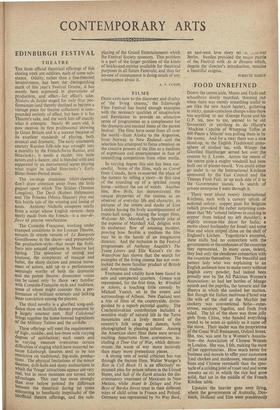CONTEMPORARY ARTS
EDINBURGH FESTIVAL
THEATRE
The three official theatrical offerings of this closing week are oddities, each of some sub- stance. Oddity, rather than a fine-frenzied Inventiveness, has been the distinguishing mark of this year's Festival Drama; it has mostly been expressed in aberrations of production, and effect—for effect's sake. Histoire di Soldat staged for only four per- formances (and thereby destined to become a vintage piece for theatre collectors) is com- pounded entirely of effect, but here it is for Theatre's sake, and the work hits off exactly what it attempts. Nearly 40 years old, it now receives its first professional showing in Great Britain and is a success because of its excellent standards of playing, both musical and dramatic. The early nineteenth century Russian folk-tale was wrought into a morality by the French-Swiss Ramuz, and Stravinsky; it needs a reader, two male actors and a dancer, and is blended with and supported by an instrumental septet playing what might be called Stravinsky's Early Bitter-Sweet-Period music.
The on-stage musicians (shirt-sleeved) don't draw attention away from the little guignol upon which The Soldier (Terence Longdon), The Devil (Robert Helpmann) and The Princess (Moira Shearer) play out this brittle tale of the winning and losing of souls. Anthony Nicholls comperes neatly from a script whose English version—here newly made from the French—is a tour-de- force of precise versification.
The Comedie Frangaise, working under cramped conditions in the Lyceum Theatre, Mounts its ornate version of Le Bourgeois Gentilhomme in the decor—and presumably the production-style--that swept the Polit- buro into amazed applause in Moscow last Spring. The splendour of setting and costume, the complexity of maSque and ballet, the sharp diction and precise move- ment of actors, add up to a performance seemingly worthy of both the dramatist and the parent theatre: dissentient voices can be raised only by those very familiar With Comedie-Francaise style and tradition, Some of whom might consider this a per- °nuance of brilliant externals and lacking er conviction among the players.
The third novelty is a glorified song-and- dance show on Scottish themes presented by it largely amateur cast. Hail Caledonia! brings together the home-brewed ingredients of the Military Tattoo and the ceitidhe. '
These offerings will meet the requirements of high-, middle-, and low-brow with varying degrees of satisfaction; each meets and in varying measure overcomes certain difficulties of staging which have occurred be- cause Edinburgh theatres tend to be too restrictive on traditional, big-scale, produc- tions. The physical limitations of the minor theatres, drill-halls and dusty auditoriums in Which the 'fringe' attractions appear are very real, but in most instances are turned into advantages. This year has more strongly tban ever before pointed the difference between the theatrical daring (at times amounting to bombastic ineptitude) of the Unofficial theatre offerings, and the safe-
playing of the Grand Entertainments which the Festival Society sponsors. This problem is a part of the larger problem of the kinds of bricks-and-mortar available for theatrical purposes in all future Festivals; and thus far no-one of consequence is doing much of any consequence about it.
A. V. COION


































 Previous page
Previous page